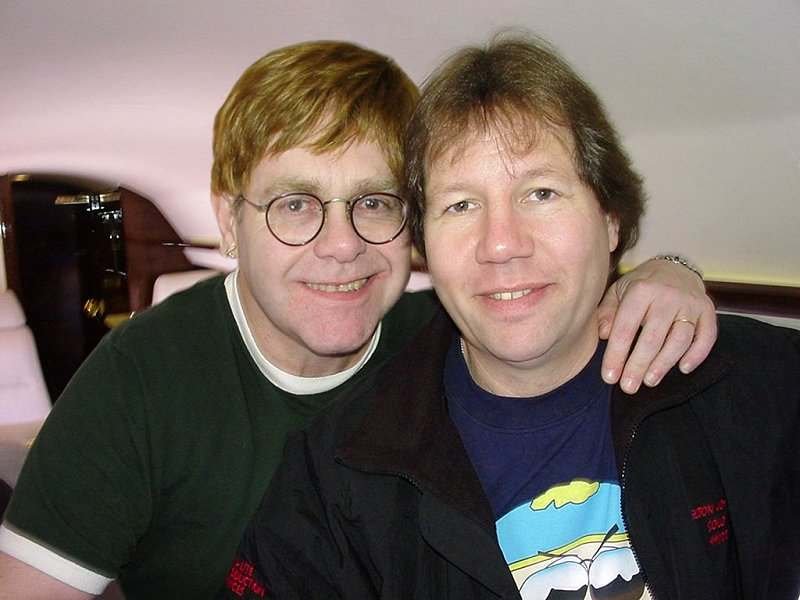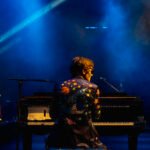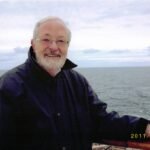 We mine our Elton archives each month to showcase news or features you won’t find anywhere else! Edited by Fran Gilles
We mine our Elton archives each month to showcase news or features you won’t find anywhere else! Edited by Fran Gilles
29/07/2000
By George Matlock
Exclusive interview with Clive Franks Elton’s tour sound engineer (part 1)
It’s not every day this cultured and profound technician provides an interview opportunity. In fact, after 28 years on the road as Elton’s tour sound engineer, and producer of three Elton albums he’s only ever given three interviews.
So understand George Matlock’s pride that Clive Franks, who in his own words doesn’t seek fame and likes to stay in the shadows, agreed to shine and not fade away. By his own admission the three albums he produced, A Single Man, 21 at 33, and The Fox, are “all the one’s that never sold!” He also mixed The Thom Bell Sessions.
Clive Franks has an unassuming, man-next-door, allure, and a modesty that disguises his great talent which Elton’s biggest fans ever attempt to quantify, while many more will at least acknowledge.
I was under the impression Elton Solo was just that. Elton at the keyboard. Checking out Clive’s box of tricks during the recent Hyde Park, London show on July 27, 2000, was an eye-opener. I realised there were two magical artists at work, two pairs of dexterious hands moving to the beat of music and life.
The soundboard looks like a nuclear warhead arsenal, or a chess board. In fact, there are more knobs here than in the average football team Watford face in Division One this season!
And yet, Clive knows which knob to tweak, and which fader to drive, and when. He fills in, singing the percussion sounds of the original recording as he hears the new, pared-down piano solo versions on stage.
Although not pre-recorded, when Elton played his sell-out summer 2000 tour, he did so with the help of Clive’s judicious offering of special effects. Clive apologised the sound system at Hyde Park was a hired item used by the series of non-Elton shows that week at the venue rather than his preferred equipment. Those acts included Steps, Five, and Buena Vista Social Club. But his mixer was his. A daunting console, with labels under faders like “ME”, “X”, “Spare”, “EJ”, “LO”, “HI”, “Piano Yam”, “Piano Strings”, “EFX”, and “TC”.
Clive was keeping some 12 meters flicking at between -5 and -3 on his Yamaha Mixing Console PM4000 behemoth.
While most fans huddle up close to Elton in the front row – Clive is happy knowing he’s got the best seat in the house. Mid-way back is where the sound off those awesome amplifier speakers, or PAs in technospeak, finally optimises.
In a more relaxed atmosphere between shows in London, July 12, 2000, Clive gave a 2 and a half hour interview – I later reminded him that’s the length of Elton’s recent shows!
Clive Franks: I’ll just take this nice Coke from the fridge (free publicity to a recent sponsor of the tour). I have a sore throat after talking with a friend for four hours today.
George Matlock: What went wrong at Hyde Park (Party in the Park, July 9, 2000)?
CF: Mainly the weather, for the crowds. Half an hour before Elton was to go on there was this massive downpour. There was a 3-inch puddle outside his dressing room. Something got damp. There was chaos. The problem was that I was receiving (sound) on everything, so I assumed the piano was fine. I think it was something to do with the monitors. It wasn’t our monitors. We were jumping in on the venue’s common system for all the 30-odd acts performing that day. You’re busking it in a situation like that. Then when the monitors came through it was so loud it took everyone’s head off! It was embarrassing. Elton came on, sat for a bit, couldn’t hear anything, went off, came back on again. Once they got going [with the Backstreet Boys] they were fine.
GM: When Kylie Minogue came on, there was a noticeable delay between movements and sound.
CF: I noticed the video screens were out of time with the vocals. This happens when you’re a long way from a video screen, because sound travels slower than light. There is no excuse for that on television [the programme was televised by Channel 4]. A lot of people complained to me about that. I can’t answer that one. You see, I’m not sure everyone was singing. I think there was some miming going on. Some people aren’t that good at lip synching. All this dance routine these days really annoys me. Some people are so focused on their dance, they can’t deliver a good vocal performance. Elton is not having to dance, he’s behind a piano. Of course, he did get up after Philadelphia Freedom [to stand and dance with the Boys]. But no, he’s totally live.
GM: You can vouch for Elton never miming?
CF: Never mimed in a live performance.
GM: How about the pre-recorded BBC TV show Top of the Pops?
CF: Early days, yes [he did]. They wouldn’t let you do it otherwise! They couldn’t reproduce the sound, and so many people didn’t want to do it live because they couldn’t. And the record companies wanted the audience to hear exactly how the record sounded. But Elton would always want to sing it live. And where possible he did. But he’s a brilliant lip syncher, so sometimes even for myself it was difficult to tell whether he was miming or live. He does it so well. But [on tour] I can tell from the sound whether it’s a live recording or not without looking up at the stage. And I can tell you he’s never mimed on tour.
Clive was often to fill-in for missing band members on Top of the Pops. He’s seen himself on Goodbye Yellow Brick Road in place of bassist Dee Murray.
CF: On those early Top of the Pops, some bands would record a version an hour before the performance, then mime as the TV cameras recorded it all.
GM: [at July 9 performance] When Elton sang Friends Never Say Goodbye, the first time he sang “never say goodbye” it was delivered very slowly. Did you notice that?
CF: When we’re on tour, we pick up on the little nuances day after day. But this was got together only at midday for rehearsals. We were at the rehearsal studios for two and a half hours, minus one of the Backstreet Boys who was missing. Elton was concerned lyrically not to mess up and ordered an auto-cue. Whether he got one I’m not sure. Elton’s such a perfectionist. As you know, he’s forever mouthing sideways “more of this, less of that” and “turn this up”. It was also difficult for me to focus because there were three mixing consoles, and each alternated between acts. Of the three consoles, two are ones I use on tours and the third is the type I dislike, and which shall remain nameless. That’s the one I had to use! So, I was concentrating on their balance and level, rather than lyrically to what’s going on. Elton’s reverb wasn’t right. I didn’t actually see him after the show, because he had interviews to do backstage. Meanwhile, me, Elton’s assistant and the crew were taken out to a wonderful Indian restaurant. And I’ve not seen Elton since. I asked his assistant Bob, who said Elton was a little tense but he enjoyed it.
GM: For the final two songs, Elton seemed to really enjoy things. He was not seated at the piano, even gave a wiggle with his backside! His voice projected better, he looked more relaxed, as though the piano had been a ball and chain! Do you have post mortems about performances?
CF: No. He has to be the most consistent performer – ever. I’ve worked with him since 1972. And perhaps half a dozen gigs were below par – but that’s on HIS standard. If we’re doing a quick getaway to the airport after a show, in the car, Elton will rather focus on the highlights. He might say, beaming like a child: “Oooh, that was great wasn’t it? What about that little bit on Rocket Man, or that solo bit.” But it’s rarely ever an inquest going the other way, because there’s never anything negative to focus on. Maybe at the start of a tour, when we haven’t locked in a set list he’s happy with, we’ll have a little talk about whether Daniel should come before or after some song? Should we do such song? That would go on for a couple of shows. And he very rarely talks anyway. Sometimes we don’t even say a thing after the shows.
GM: Talking of airports, we heard Elton went back to the South of France after most of his German gigs. Is that true?
CF: Yes, on a private charter plane.
GM: And what of the other ingredient that makes a show, the crowd?
CF: He works so hard to get the audience to their feet. These shows are more of a challenge because they’re intimate shows, solo. If the audience isn’t moving, he works them. It’s harder without the band, as he performs more ballads. He can’t do “Saturday Night’s” or “The Bitch is Back”. So it’s harder for the crowd to get enthusiastic in any part of the world – except the USA. They seem go nuts at everything! But I’ve noticed in England and Europe they’ll sit and listen to him. Very appreciative and wonderful audiences between songs, but during songs they don’t emote much.
GM: Except for that small band of fans to the front!
CF: He loves that. I would wish people would go up sooner.
GM: We would, but security won’t let us!
CF: Yeah, but you have to realise that there are people near the front who paid for tickets and can’t see a thing. We were in Austria, in the show just before Bregenz in June, and we were in a town square and no seating. It was like a festival. The atmosphere was the best we’ve had the whole tour. Everyone was up and with him from the very start. I’m sure countless barrels of beer had something to do with it too! A totally different, American vibe. They picked up on everything and went nuts. But when we got back to Germany, we had good audiences, but the rain was awful.
GM: Most of the fans complained there were so many shows this year, and they couldn’t afford to go to all of them.
CF: What I don’t understand is why does anyone want to go to all of them?
GM: You’re right, he’s already bringing the music to smaller venues, closer to the fans and accessing more territory. But the fans still come again and again! I was at Germany’s Kassel, Hamburg and Cologne shows, but perhaps because I hadn’t heard Elton indoors for a long time, the Cologne show was a disappointment. The music all just merged.
CF: Accoustically, it’s a very difficult room. It’s cavernous. We used our own sound system and supplemented with theirs to fill up in the Gods. But that was one of my favourite shows, believe it or not. The fans were great and Elton loved that show because he could feel the feedback from the audience. I was pleased with the results. If you were at the front, you heard only his loud monitors, which are trained for him, and anyone slightly away from that distance, such as the crowds in the first six rows, will get a very strange sound. You would have heard his monitors rather than my mix. So it was reflective sound, very mushy.
GM: And Munich, where Elton’s throat was rough. What happened there?
CF: Things sometimes do go wrong, as you know. I checked everything. Elton started to sing. I could hear his voice coming from the monitors but not the mixed PA. I freaked out! The first few lines didn’t come out. I use a limiter on Elton’s voice which keeps the volume constant and controls any unexpected loud peaks. Unfortunately, the damp weather had caused moisture to get onto the jackplug which then cut out Elton’s voice from the PA, so we had to carefully pull the plug in and out a few times to get it working, and then it was fine. Makes live shows exciting and unpredictable!









